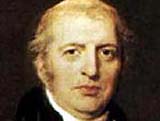Robert Banks Jenkinson, Earl of Liverpool 1812-27 Tory
(单词翻译:单击)
 Born: 7 June 1770 in London
Born: 7 June 1770 in London
First entered Parliament: 7 June 1791
Age he became PM: 42 years, one day
Maiden1 speech: 29 February 1792 speaking against a motion censuring2 the Government for actions increasing the size of the Navy to combat the Russian invasion of Turkey
Total time as PM: 14 years, 305 days
Died: 4 December 1828 at Kingston-upon-Thames, Surrey
Facts and figures
Education: Charterhouse and Christ's Church College, Oxford3
Family: Liverpool was the only child of his father's first marriage. His father went on to have two more children from his second marriage. Liverpool was married twice (to Lady Louisa Theodosia Hervey and then Mary Chester), but had no children.
Interests: Art (he founded the National Gallery in 1824), literature
Biography
Restoring order
Liverpool became known for repressive measures introduced to restore order, but he also steered4 the country through the period of radicalism6 and unrest which followed the Napoleonic Wars.
Having served earlier in his career as leader of the House of Lords, Foreign Secretary and War Secretary, Liverpool was asked to form a government after the assassination7 of Spencer Perceval in 1812.
Few expected Liverpool to survive in office very long, as at first his government seemed very insecure.
But the opposition8 provided by the Whig party was weak and disunited, and Liverpool was able to draw on the talents of individuals such as Sidmouth, The Duke of Wellington, Castlereagh and Canning.
The ending of the Napoleonic Wars with France in 1815, aided by Wellington's victories in the field, further boosted support for Liverpool.
massacre13" src="http://www.enread.com/upimg/allimg/20070317/0832391.jpg" width="160" border="0" />But after the war, unrest broke out at home, partly caused by an economic recession that started in 1817. Unemployment, a bad harvest and high prices produced riots and protests.
Actions such as the repeal9 of income tax and the creation of the Corn Laws tended to make the situation worse. Lord Liverpool's government reacted by suspending habeas corpus for two years.
Things became even worse in summer 1819, when large gatherings10 in favour of parliamentary reform culminated11 in a massive public meeting in Manchester on 16 August. Soldiers attacked the crowds, killing12 eleven and wounding many more.
Shocking massacre
The shocking event became known as the Peterloo Massacre. Liverpool's subsequent 'Six Acts' curtailed14 the right to hold radical5 meetings.
The crackdown on liberty prompted an attempt by radicals15 in 1820 to murder Liverpool and his Cabinet and start a radical revolution.
But the Cato Street Conspiracy16, as it became known, proved unsuccessful, and the conspirators17 were hung or transported.
During the 1820s Liverpool's policy became increasingly liberal, and a period of economic prosperity began.
Liverpool also returned Britain to the Gold Standard in 1819. The anti-trade union laws were repealed18, and many trading restrictions19 were removed.
A stroke forced Liverpool to resign and he died the following year.
Quote unquote
"(I consider) the right of election as a public trust, granted not for the benefit of the individual, but for the public good."
Did you know?
Liverpool Street (and its train station) in London are both named after the Earl.
First wife - Louisa Theodosia Hervey
Her parents separated when she was in her teens and she led a dull and isolated20 life with her mother in Suffolk. Her marriage to Liverpool was destined21 to be childless and she devoted22 much of her life to charitable work while enjoying the social side of her husband's career. They were a devoted couple but she died at 54.
Second wife - Mary Chester
Liverpool married again to Mary Chester, a long-time friend of Louisa. Their marriage was short-lived though as the Earl died just three years into their union.
 收听单词发音
收听单词发音
1
maiden

|
|
| n.少女,处女;adj.未婚的,纯洁的,无经验的 | |
参考例句: |
|
|
|
2
censuring

|
|
| v.指责,非难,谴责( censure的现在分词 ) | |
参考例句: |
|
|
|
3
Oxford

|
|
| n.牛津(英国城市) | |
参考例句: |
|
|
|
4
steered

|
|
| v.驾驶( steer的过去式和过去分词 );操纵;控制;引导 | |
参考例句: |
|
|
|
5
radical

|
|
| n.激进份子,原子团,根号;adj.根本的,激进的,彻底的 | |
参考例句: |
|
|
|
6
radicalism

|
|
| n. 急进主义, 根本的改革主义 | |
参考例句: |
|
|
|
7
assassination

|
|
| n.暗杀;暗杀事件 | |
参考例句: |
|
|
|
8
opposition

|
|
| n.反对,敌对 | |
参考例句: |
|
|
|
9
repeal

|
|
| n.废止,撤消;v.废止,撤消 | |
参考例句: |
|
|
|
10
gatherings

|
|
| 聚集( gathering的名词复数 ); 收集; 采集; 搜集 | |
参考例句: |
|
|
|
11
culminated

|
|
| v.达到极点( culminate的过去式和过去分词 ) | |
参考例句: |
|
|
|
12
killing

|
|
| n.巨额利润;突然赚大钱,发大财 | |
参考例句: |
|
|
|
13
massacre

|
|
| n.残杀,大屠杀;v.残杀,集体屠杀 | |
参考例句: |
|
|
|
14
curtailed

|
|
| v.截断,缩短( curtail的过去式和过去分词 ) | |
参考例句: |
|
|
|
15
radicals

|
|
| n.激进分子( radical的名词复数 );根基;基本原理;[数学]根数 | |
参考例句: |
|
|
|
16
conspiracy

|
|
| n.阴谋,密谋,共谋 | |
参考例句: |
|
|
|
17
conspirators

|
|
| n.共谋者,阴谋家( conspirator的名词复数 ) | |
参考例句: |
|
|
|
18
repealed

|
|
| 撤销,废除( repeal的过去式和过去分词 ) | |
参考例句: |
|
|
|
19
restrictions

|
|
| 约束( restriction的名词复数 ); 管制; 制约因素; 带限制性的条件(或规则) | |
参考例句: |
|
|
|
20
isolated

|
|
| adj.与世隔绝的 | |
参考例句: |
|
|
|
21
destined

|
|
| adj.命中注定的;(for)以…为目的地的 | |
参考例句: |
|
|
|
22
devoted

|
|
| adj.忠诚的,忠实的,热心的,献身于...的 | |
参考例句: |
|
|
|




